The global marine collagen-based products market is projected to grow from USD 2,653.1 million in 2025 to approximately USD 8,166.8 million by 2035, recording an absolute increase of USD 5,581.16 million over the forecast period. This translates into a total growth of 212.8%, with the market forecast to expand at a compound annual growth rate (CAGR) of 11.9% between 2025 and 2035. The overall market size is expected to grow by nearly 3.13X during the same period, supported by the rising demand for natural and sustainable beauty ingredients and increasing consumer awareness of marine-derived collagen benefits.
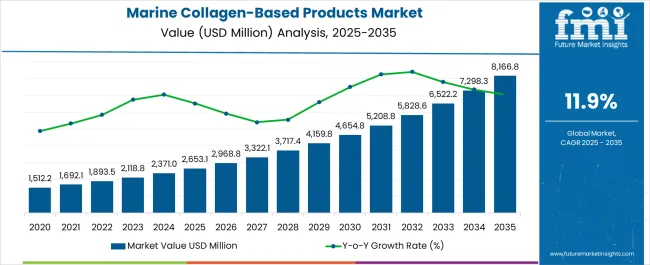
Between 2025 and 2030, the marine collagen-based products market is projected to expand from USD 2,653.1 million to USD 4,665.2 million, resulting in a value increase of USD 2,042.96 million, which represents 36.6% of the total forecast growth for the decade. This phase of growth will be shaped by rising consumer preference for natural and sustainable beauty ingredients, increasing awareness of marine collagen's superior bioavailability compared to traditional sources, and growing adoption in both topical and nutraceutical applications. Manufacturers are expanding their product portfolios to include innovative delivery formats and enhanced formulations targeting specific skin concerns.
From 2030 to 2035, the market is forecast to grow from USD 4,665.2 million to USD 8,166.8 million, adding another USD 3,538.2 million, which constitutes 63.4% of the overall ten-year expansion. This period is expected to be characterized by expansion into emerging markets, development of advanced extraction technologies, and integration of marine collagen into premium beauty and wellness products. The growing emphasis on clean-label and sustainably sourced ingredients will drive demand for certified marine collagen products and specialized processing techniques.
Between 2020 and 2025, the marine collagen-based products market experienced robust expansion, driven by increasing consumer awareness of anti-aging solutions and growing demand for natural alternatives to synthetic ingredients. The market developed as beauty and wellness brands recognized the superior properties of marine-derived collagen and its compatibility with various formulation types. Sustainability concerns and environmental consciousness began driving preference for responsibly sourced marine ingredients over traditional collagen sources.
| Metric | Value |
|---|---|
| Estimated Value in (2025E) | USD 2,653.1 million |
| Forecast Value in (2035F) | USD 8,166.8 million |
| Forecast CAGR (2025 to 2035) | 11.9% |
Market expansion is being supported by the growing consumer preference for natural and sustainable beauty ingredients and the superior bioavailability and effectiveness of marine-derived collagen compared to traditional sources. Modern consumers are increasingly seeking products that deliver visible anti-aging results while aligning with their environmental values and clean beauty preferences. Marine collagen offers enhanced absorption rates and compatibility with various product formulations, making it ideal for both topical and ingestible applications.
The rising awareness of skin health and preventive aging care is driving demand for premium collagen-based products from certified suppliers with appropriate sustainability credentials. Beauty brands are increasingly incorporating marine collagen into high-performance formulations to meet consumer expectations for efficacy and natural ingredient transparency. Regulatory support for sustainable sourcing and growing scientific evidence of marine collagen benefits are establishing standardized quality parameters that support market credibility and consumer confidence.
The market is segmented by source, function, product type, channel, claim, and region. By source, the market is divided into fish-derived collagen, marine peptides, algae-based collagen, and jellyfish-derived collagen. Based on function, the market is categorized into anti-aging & wrinkle repair, firming & elasticity, hydration support, and skin barrier strengthening. In terms of product type, the market is segmented into serums, creams/lotions, masks, and capsules/powders (nutricosmetics). By channel, the market is classified into e-commerce, pharmacies, specialty beauty retail, and health & wellness stores. By claim, the market is divided into natural/organic, sustainably sourced, clean-label, and vegan-friendly alternatives. Regionally, the market spans across major global markets with significant presence in Asia Pacific, North America, and Europe.
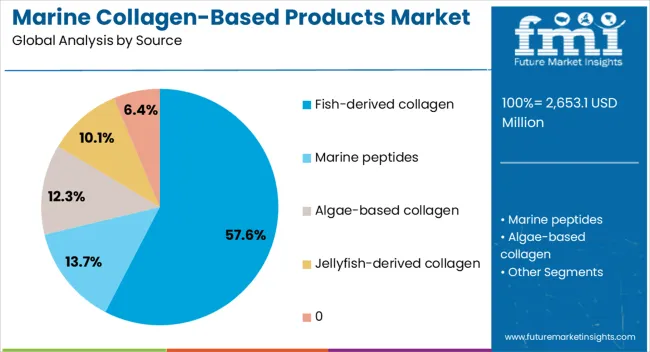
Fish-derived collagen is projected to account for 57.6% of the marine collagen-based products market in 2025. This leadership is underpinned by mature supply chains and proven processing technologies that enable efficient extraction from fish skins, scales, and bones, ensuring both quality consistency and cost-effectiveness. Fish collagen peptides are highly bioavailable, with smaller molecular weights that allow for superior absorption compared to other collagen sources, making them especially attractive in anti-aging supplements and topical formulations.
Their broad cultural and dietary acceptance, unlike bovine or porcine sources, further widens their global appeal, particularly in markets with religious or dietary restrictions. Regulatory approvals and robust scientific studies validating fish collagen’s role in skin hydration, elasticity, and wrinkle reduction provide additional credibility. Together, these factors establish fish-derived collagen as the cornerstone source within the marine collagen category, fueling both mainstream adoption and premium innovation.
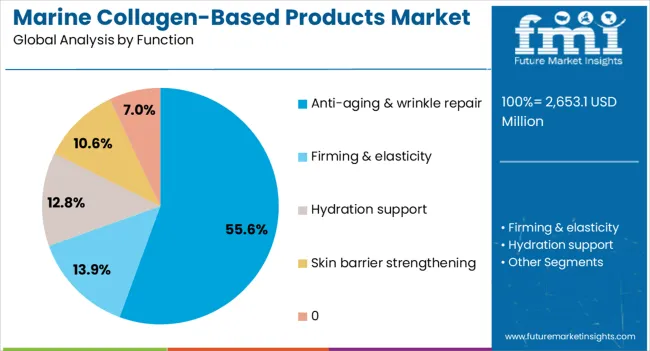
Anti-aging and wrinkle repair applications are forecasted to represent 55.6% of marine collagen product demand in 2025. This commanding share highlights that visible signs of aging remain the foremost consumer concern in the beauty and nutraceutical sectors. Marine collagen, with its smaller peptide size and high bioavailability, is clinically proven to stimulate collagen synthesis, improve skin elasticity, and reduce wrinkle depth.
Consumers increasingly seek products backed by science and measurable results, reinforcing collagen’s role as a cornerstone in anti-aging regimens. The segment also benefits from strong cross-category adoption, with marine collagen featured in supplements, functional beverages, and topical formulations alike. As aging populations expand globally and younger demographics embrace preventive skincare, demand for anti-aging and wrinkle repair solutions will remain the strongest driver of growth, positioning marine collagen as a premium and trusted active ingredient.
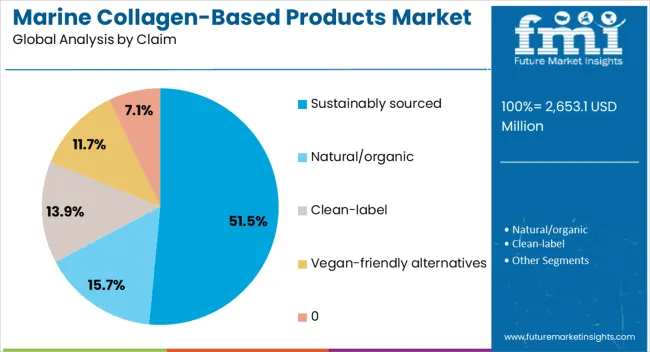
Sustainably sourced products are projected to contribute 51.5% of the marine collagen market in 2025. This leading position reflects the growing influence of conscious consumption, where consumers evaluate not just product efficacy but also its environmental and ethical footprint. Marine collagen, derived from fish by-products such as skin and scales, aligns well with the sustainability narrative by supporting waste valorization and circular economy practices. Brands leveraging sustainability claims benefit from greater differentiation and increased trust, particularly among younger demographics that prioritize eco-friendly choices.
Certification schemes, third-party audits, and digital traceability tools further validate sourcing practices, strengthening consumer confidence. Moreover, retailers and e-commerce platforms increasingly demand sustainability assurances, pushing brands to adopt transparent supply chain practices. With environmental awareness becoming a central purchase driver, sustainably sourced marine collagen products are set to command enduring loyalty and premium positioning.
The marine collagen-based products market is advancing rapidly due to increasing consumer awareness of natural anti-aging solutions and growing demand for sustainable beauty ingredients. However, the market faces challenges including supply chain complexities for marine sourcing, higher costs compared to synthetic alternatives, and varying regulatory requirements across different regions. Innovation in extraction technologies and sustainable sourcing practices continue to influence product development and market expansion patterns.
The growing integration of marine collagen into nutraceutical products is enabling new consumption patterns and expanding market reach beyond traditional topical applications. Innovative delivery formats including powders, capsules, and functional beverages provide convenience and enhanced bioavailability for consumers seeking comprehensive skin health support. These products particularly appeal to health-conscious consumers who prefer ingestible beauty solutions that work from within to improve skin appearance and overall wellness.
Modern marine collagen producers are incorporating advanced extraction techniques and enzymatic processing methods that improve product purity and bioactivity while maintaining sustainable sourcing practices. Integration of molecular weight optimization and peptide profiling enables more targeted product formulations for specific skin concerns and enhanced consumer benefits. Advanced processing also supports development of specialized marine collagen variants that offer improved stability and formulation compatibility across diverse product categories.
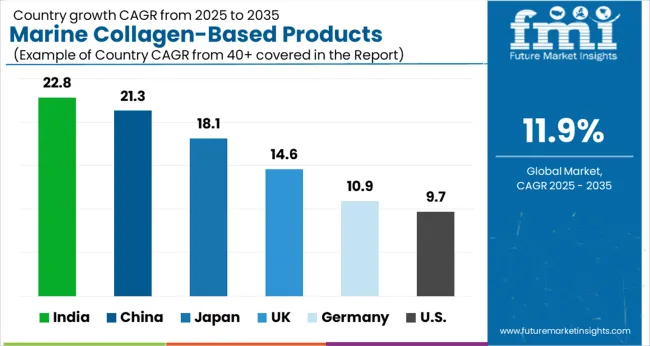
| Country | CAGR (2025 to 2035) |
|---|---|
| India | 22.8% |
| China | 21.3% |
| Japan | 18.1% |
| UK | 14.6% |
| Germany | 10.9% |
| USA | 9.7% |
The marine collagen-based products market is experiencing robust growth globally, with India leading at a 22.8% CAGR through 2035, driven by rising disposable income, growing beauty consciousness, and increasing adoption of premium skincare products. China follows closely at 21.3%, supported by strong domestic demand for anti-aging solutions and expanding e-commerce penetration.
Japan demonstrates significant growth at 18.1%, emphasizing advanced formulation technologies and premium product positioning. The UK shows strong expansion at 14.6%, driven by sustainability-focused consumer preferences and clean beauty trends. Germany and the USA exhibit steady growth at 10.9% and 9.7% respectively, reflecting mature market dynamics with focus on product innovation and regulatory compliance.
The report covers an in-depth analysis of major global markets; six top-performing regions are highlighted below.
Revenue from marine collagen-based products in India is projected to exhibit the highest growth rate with a CAGR of 22.8% through 2035, driven by rapidly expanding middle-class population and increasing awareness of premium skincare solutions. The country's growing e-commerce infrastructure and rising disposable income are creating significant demand for innovative beauty products. Major international and domestic brands are establishing comprehensive distribution networks to serve the expanding consumer base across urban and semi-urban markets.
Revenue from marine collagen-based products in China is expanding at a CAGR of 21.3%, supported by sophisticated digital commerce platforms and increasing consumer preference for premium imported beauty ingredients. The country's advanced logistics infrastructure and growing beauty consciousness among younger demographics are driving demand for innovative marine collagen formulations. Specialized beauty retailers and online platforms are establishing comprehensive product offerings to serve diverse consumer preferences and price points.
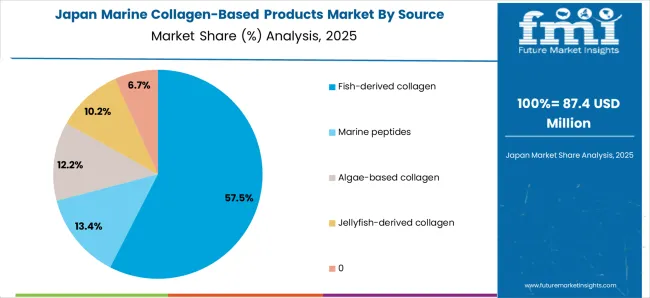
Revenue from marine collagen-based products in Japan is growing at a CAGR of 18.1%, driven by sophisticated consumer preferences for high-quality ingredients and proven efficacy. The country's established beauty industry infrastructure and emphasis on product innovation are supporting development of advanced marine collagen formulations. Premium beauty retailers and specialized channels are maintaining focus on quality and performance while expanding accessibility to broader consumer segments.
Demand for marine collagen-based products in the UK is projected to grow at a CAGR of 14.6%, supported by strong consumer preference for sustainable and ethically sourced beauty ingredients. British beauty brands are implementing comprehensive sustainability practices that meet stringent environmental standards and consumer expectations. The market is characterized by focus on transparency, clean formulations, and compliance with evolving regulatory requirements for natural beauty products.
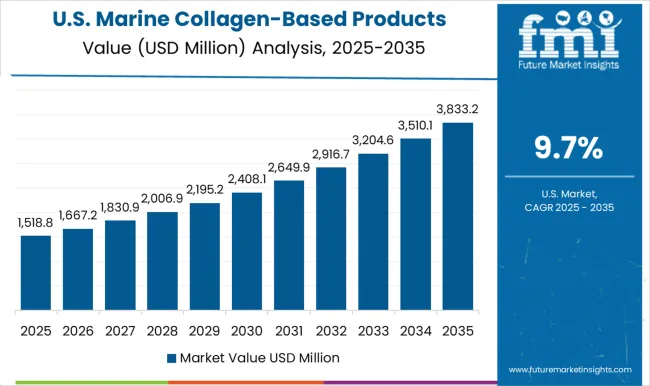
Demand for marine collagen-based products in the USA is expanding at a CAGR of 9.7%, driven by established beauty industry infrastructure and consumer preference for scientifically validated ingredients. Large beauty retailers and specialized wellness channels are maintaining comprehensive marine collagen product portfolios to serve diverse consumer needs. The market benefits from advanced research capabilities and regulatory framework that supports product innovation and consumer safety.
Demand for marine collagen-based products in Germany is projected to grow at a CAGR of 10.9%, supported by the country’s strong emphasis on clinically validated beauty and health solutions. German consumers show high awareness of ingredient efficacy, safety, and sustainability, positioning marine collagen as a preferred choice in both nutraceuticals and premium skincare applications. The market benefits from a robust pharmaceutical and nutraceutical manufacturing base and strict regulatory standards that ensure product quality and consumer trust.
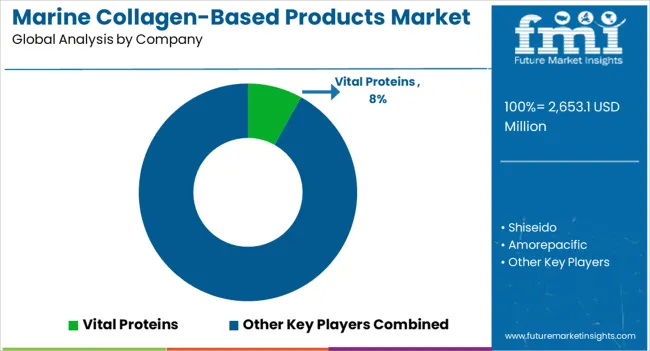
The marine collagen-based products market is characterized by competition among established beauty corporations, specialized ingredient suppliers, and innovative wellness brands. Companies are investing in sustainable sourcing practices, advanced extraction technologies, product innovation, and strategic partnerships to deliver high-quality, effective, and environmentally responsible marine collagen solutions. Brand differentiation, scientific validation, and consumer education are central to strengthening market position and expanding global presence.
Vital Proteins leads the global market with an 8% share in 2025, leveraging its strong brand recognition and comprehensive product portfolio across both beauty and wellness categories. The company's focus on transparency, sustainability, and consumer education has established it as a trusted leader in the marine collagen space. Other significant players collectively represent 91.9% of the market, indicating a highly fragmented competitive landscape with opportunities for consolidation and market share expansion.
Major competitors include Shiseido with advanced formulation capabilities and premium positioning, Amorepacific focusing on Asian market leadership and innovative delivery systems, and Nitta Gelatin providing specialized ingredient expertise and manufacturing capabilities. Rousselot, Ashland, Weider, Neocell, Fancl, and BASF contribute through diversified product offerings, technological innovation, and strategic market positioning across different geographic regions and consumer segments.
| Items | Values |
|---|---|
| Quantitative Units (2025) | USD 2,653.1 million |
| Source | Fish-derived collagen, Marine peptides, Algae-based collagen, Jellyfish-derived collagen |
| Function | Anti-aging & wrinkle repair, Firming & elasticity, Hydration support, Skin barrier strengthening |
| Product Type | Serums, Creams/lotions, Masks, Capsules/powders (nutricosmetics) |
| Channel | E-commerce, Pharmacies, Specialty beauty retail, Health & wellness stores |
| Claim | Natural/organic, Sustainably sourced, Clean-label, Vegan-friendly alternatives |
| Regions Covered | North America, Europe, Asia Pacific, Latin America, Middle East & Africa |
| Countries Covered | United States, Canada, United Kingdom, Germany, France, China, Japan, South Korea, India, Brazil, and 40+ countries |
| Key Companies Profiled | Vital Proteins, Shiseido, Amorepacific, Nitta Gelatin, Rousselot, Ashland, Weider, Neocell, Fancl, and BASF |
| Additional Attributes | Dollar sales by source and collagen type, regional demand trends, competitive landscape, buyer preferences for powder versus liquid and capsule formats, integration with clean-label and nutricosmetics positioning, innovations in enzymatic hydrolysis, peptide purity, and sustainability certifications |
The global marine collagen-based products market is estimated to be valued at USD 2,653.1 million in 2025.
The market size for the marine collagen-based products market is projected to reach USD 8,166.8 million by 2035.
The marine collagen-based products market is expected to grow at a 11.9% CAGR between 2025 and 2035.
The key product types in marine collagen-based products market are fish-derived collagen , marine peptides, algae-based collagen, jellyfish-derived collagen and .
In terms of function , anti-aging & wrinkle repair segment to command 55.6% share in the marine collagen-based products market in 2025.






Full Research Suite comprises of:
Market outlook & trends analysis
Interviews & case studies
Strategic recommendations
Vendor profiles & capabilities analysis
5-year forecasts
8 regions and 60+ country-level data splits
Market segment data splits
12 months of continuous data updates
DELIVERED AS:
PDF EXCEL ONLINE
Marine Electronics Market Size and Share Forecast Outlook 2025 to 2035
Marine Toxin Market Size and Share Forecast and Outlook 2025 to 2035
Marine Thermal Fluid Heaters Market Size and Share Forecast Outlook 2025 to 2035
Marine Nutraceutical Market Size and Share Forecast Outlook 2025 to 2035
Marine Power Battery System Market Size and Share Forecast Outlook 2025 to 2035
Marine Life Raft Market Size and Share Forecast Outlook 2025 to 2035
Marine Trenchers Market Size and Share Forecast Outlook 2025 to 2035
Marine Electronics Tester Market Size and Share Forecast Outlook 2025 to 2035
Marine Steering Systems Market Size and Share Forecast Outlook 2025 to 2035
Marine & Dock Gangways Market Size and Share Forecast Outlook 2025 to 2035
Marine HVAC System Market Size and Share Forecast Outlook 2025 to 2035
Marine Outboard Engines Market Size and Share Forecast Outlook 2025 to 2035
Marine Stabilizers Market Size and Share Forecast Outlook 2025 to 2035
Marine Fuel Injection System Market Size and Share Forecast Outlook 2025 to 2035
Marine Energy Market Size and Share Forecast Outlook 2025 to 2035
Marine Propulsion Engine Market Size and Share Forecast Outlook 2025 to 2035
Marine Protein Hydrolysate Market Size and Share Forecast Outlook 2025 to 2035
Marine Fin Stabilizer Market Size and Share Forecast Outlook 2025 to 2035
Marine Extract Market Size and Share Forecast Outlook 2025 to 2035
Marine Squalene Alternatives Market Size and Share Forecast Outlook 2025 to 2035

Thank you!
You will receive an email from our Business Development Manager. Please be sure to check your SPAM/JUNK folder too.
Chat With
MaRIA